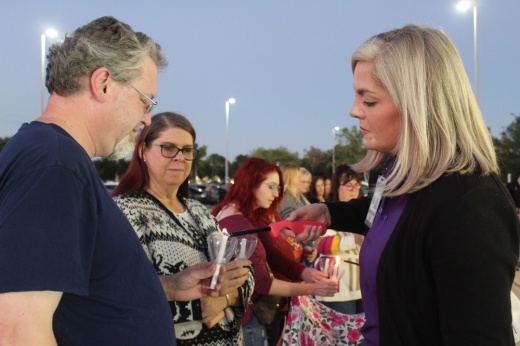Johnson is one of the many domestic violence survivors who sought help from the Houston Area Women’s Center. Speaking at a Oct. 9 news conference during National Domestic Violence Awareness Month, she said the nonprofit helped her form a plan to exit her relationship safely, gave her a safe space to live while she got back on her feet and her children continued schooling, and helped her eventually move into her own accommodations.
Today, she’s an employee of the nonprofit, helping women who were once in her situation. HAWC is one of many nonprofits and government groups in Houston seeking to reverse trends in Harris County, including a doubling of intimate partner homicides in the county from 2019 to 2022.
Two-minute impact
The data comes from a study released in February by the University of Houston’s Institute for Research on Women, Gender & Sexuality. At the same time, the number of people in the area seeking shelter was on the rise in 2022. Intimate partner violence, a subset of domestic violence, refers specifically to violence toward an intimate partner, current or former.Around 65%-75% of people who call seeking shelter space are not able to get shelter in Harris County, said Amy Smith, communications director with the Harris County Domestic Violence Coordinating Council, which Smith said works on a macro level to provide safety for survivors and hold abusers accountable.
“When you look at the domestic violence reports, it’s staggering, but those are just those reported, and it’s an underreported crime,” Smith said. “Houston just doesn’t have enough resources.”
The number of households in the HCDVCC’s housing queue rose from 589 in 2021 to 977 in 2022. The number of calls requesting shelter space grew between the two years from 956 in 2021 to 1,307 in 2022. Because children are also involved in the request for shelter, HCDVCC officials said calls for shelter require space for three people on average.
Heather Bellino is the CEO of the Texas Advocacy Project, a nonprofit that works to end domestic violence, sexual abuse and stalking. Although shelter space is in short supply statewide, Bellino also emphasized the importance of legal services, which she said is one of the highest unmet needs among survivors.
“Shelters are incredible; they are so important to have those hierarchy of needs met,” Bellino said. “The fact is, you’re batterer ... will always have access to you if you cannot sever ties legally. A temporary bed is one thing; free legal services get you where you need to go the fastest.”
Zooming in
About 73% of intimate partner violence homicides in the Houston area between 2019-22 involved guns, according to an October news release from the Houston Area Women’s Center, which cited the UH study. Additionally, the presence of a gun in an abusive household increases the risk of homicide by 500%, compared to a household without a gun, HAWC President and CEO Emilee Whitehurst said during an Oct. 9 news conference.During an Oct. 9 news conference, Whitehurst raised concerns about a ruling in February by the U.S. 5th Circuit Court of Appeals in the case of U.S. v. Rahimi. The court determined that people subject to domestic violence restraining orders have a constitutional right to possess a firearm.
The U.S. Supreme Court is expected to hear oral arguments on the case in early November, and HAWC has started a petition to have the court overturn the previous ruling.
A local look
The HAWC is in the process of opening a new facility that will triple the number of beds on site from 120 beds to 360 beds. The center will also offer:
- Behavioral health services
- A financial empowerment center
- A career counseling center
- An elementary school approved by Houston ISD
- A child care center
Once completed, HAWC officials said they hope to provide safety to at least 95% of those determined to be in danger. HAWC officials said they would sell their current office space in Montrose, valued at $12 million.
Legislative approach
Several bills passed during the 2023 legislative session in Texas and signed into law have been cited as victories by domestic violence advocates.
House Bill 2715: Gives Texas courts the power to determine if an alleged abuser should be prohibited from, without the survivor’s consent, tracking or monitoring:
- The survivor
- Their family members
- Their household members
- Vehicles
House Bill 5202: Creates a state-run website that allows the public to search a database of everyone in the state who has two or more family violence convictions. The website is expected to go live in January and will be run the by Texas Department of Public Safety.
What else?
When it comes to helping people get out of a situation where abuse is taking place, subject matter experts with Harris County nonprofits emphasized the importance of always believing survivors when they talk about what they are going through and taking them seriously.
For people who are preparing to leave abusive relationships, experts said to never tell the abuser of the intention to leave. The moment in time between when a person decides to leave and shortly after they leave is the most dangerous, officials said.
Instead of leaving on their own, individuals in this situation are urged to call one of the local resources below to form a safety plan to navigate the situation safely.
- National Domestic Violence Hotline: 800-799-7233
- Houston Area Women’s Center 24-hour domestic violence hotline: 713-528-2121
- The Bridge Over Troubled Waters 24-hour hotline: 713-473-2801





